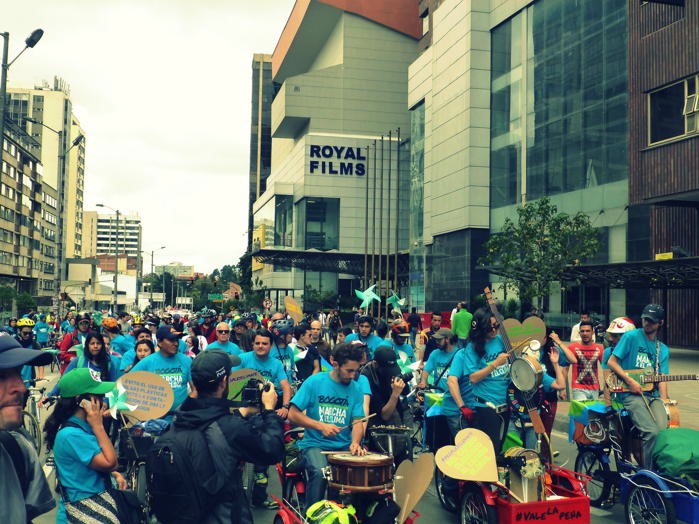September 23, 2014
By: Seble Gameda
The sounds of brass instruments, drumming, bike bells, and chants filled the streets of Bogotá, Colombia on Sunday, September 21, as over three thousand people bearing banners, posters, flags and face paint, rallied for urgent climate action, as part of the International People’s Climate March.

“We are making a global petition to the heads of state to make a binding treaty that responds to the climate crisis, and we need national and local governments to commit as well,” said Ana Sofía Suarez, Campaign Coordinator with the international citizen’s movement, Avaaz, and Event Coordinator for the People’s Climate March in Bogotá.
Over 100 world leaders are meeting in New York City to discuss the climate crisis and carbon emissions reductions, just months prior to the Conference of the Parties (COP) 20 that will take place in Lima, Peru as part of the United Nations Framework Convention on Climate Change. A binding agreement is planned to be signed at COP 21 in Paris in December 2015.
The United Nations Climate Summit in New York City will also focus on the Green Climate Fund, in which developed countries aim to raise $100 billion per year by 2020 in climate finance, in order to assist developing countries towards ‘low-carbon, climate resilient development.’
Hector Herrera, Coordinator of the Colombian Environmental Justice Network, spoke to the importance of developing countries participating in the climate marches, stating that “although the global north is primarily responsible for climate change, we in the global south are most affected, and less prepared to adapt to a changing climate.”
Demonstrations have been organized worldwide to show the power of the people’s climate movement. “We are the first generation that is really aware of climate change, but we are the last that can do something about it,” stated Juan David García, an organizer with the grassroots environmental organization 350.org.

Bogotá’s Climate March was filled with diversity; artists, professors, youth, bankers, cyclists, the elderly. As Suarez commented, “in these spaces when everyone comes together, you begin to realize that you are not alone, that we are among many who are dreaming of something different, and if we begin to demand changes, then we can make this dream happen.”
Climate change is no longer just an isolated issue of scientists and environmentalists, we are reaching a critical mass, showing once again that protest is powerful; it is the movement of people that makes change: anti-war, civil rights, healthcare, education, and … climate justice.



